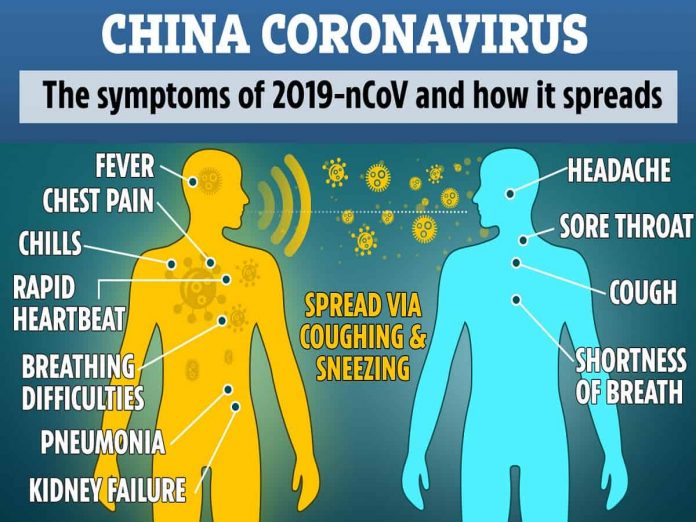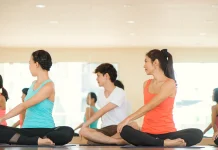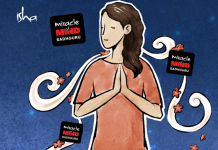The World Health Organization (WHO) declared the coronavirus a public health emergency of international concern. Originating in Hubei’s capital of Wuhan, the virus has spread throughout China and around the world. The coronavirus COVID-19 is affecting 76 countries and territories around the world and 1 international conveyance (the Diamond Princess cruise ship harbored in Yokohama, Japan).
And now in Indonesia too.
The coronavirus family is a large group of viruses that typically affect the respiratory tract. Coronaviruses can lead to illnesses like the common cold, pneumonia, and severe acute respiratory syndrome (SARS), which resulted in 8,000 cases and 774 deaths in China from November 2002 to July 2003. Authorities suspect this new coronavirus jumped from animals to people at a seafood market, and then humans started transmitting the virus to one other.
In order to understand this virus and how to prevent it, we must first understand what it is and how it spreads. It is a viral, highly contagious respiratory illness that is easily spread through airborne transmission such as sneezing and coughing, close contact with an infected person, or by touching a surface where the virus lie present.
There is currently no vaccine to prevent 2019-nCoV infection. How can we protect ourselves and our families? There is a rising sense of anxiety and panic. But very simple measures can protect you. The best way to prevent infection is to avoid being exposed to this virus. The global public health community works to keep people safe, and here are some guidelines that can be followed.
10 Basic protective measures against the new coronavirus
- Wash your hands frequently
Wash your hands frequently with an alcohol-based hand rub or soap and water.
Why? Washing your hands with an alcohol-based hand rub or soap and water kills the virus if it is on your hands.
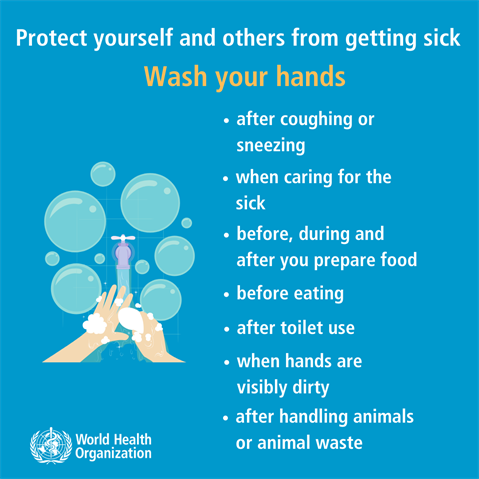
- Practice respiratory hygiene
When coughing and sneezing, cover mouth and nose with flexed elbow or tissue – discard tissue immediately into a closed bin and clean your hands with alcohol-based hand rub or soap and water.
Why? Covering your mouth and nose when coughing and sneezing prevent the spread of germs and viruses. If you sneeze or cough into your hands, you may contaminate objects or people that you touch.
- Maintain social distancing
Maintain at least 1 meter (3 feet) distance between yourself and other people, particularly those who are coughing, sneezing and have a fever.
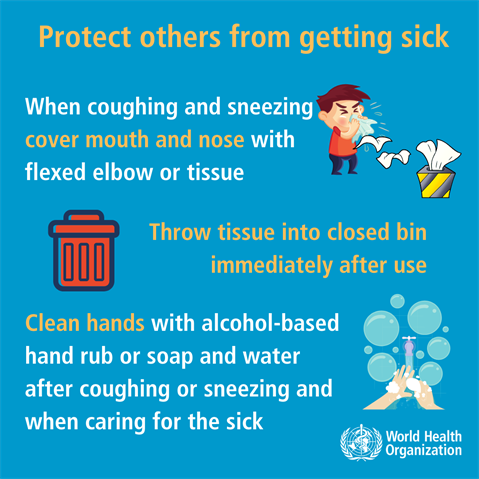
Why? When someone who is infected with a respiratory disease, like 2019-nCoV, coughs or sneezes they project small droplets containing the virus. If you are too close, you can breathe in the virus.
- Avoid touching eyes, nose and mouth
Why? Hands touch many surfaces which can be contaminated with the virus. If you touch your eyes, nose or mouth with your contaminated hands, you can transfer the virus from the surface to yourself.
- If you have fever, cough and difficulty breathing, seek medical care early
Tell your health care provider if you have traveled in an area in China where 2019-nCoV has been reported, or if you have been in close contact with someone with who has traveled from China and has respiratory symptoms.
Why? Whenever you have fever, cough and difficulty breathing it’s important to seek medical attention promptly as this may be due to a respiratory infection or other serious condition. Respiratory symptoms with fever can have a range of causes, and depending on your personal travel history and circumstances, 2019-nCoV could be one of them.
- If you have mild respiratory symptoms and no travel history to or within China
If you have mild respiratory symptoms and no travel history to or within China, carefully practice basic respiratory and hand hygiene and stay home until you are recovered, if possible.
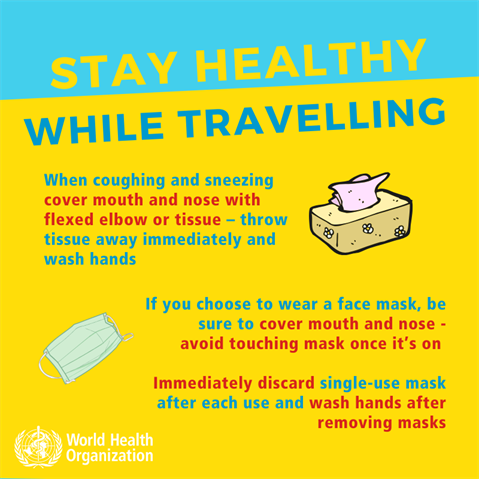
- As a general precaution, practice general hygiene measures when visiting live animal markets, wet markets or animal product markets
Ensure regular hand washing with soap and potable water after touching animals and animal products; avoid touching eyes, nose or mouth with hands; and avoid contact with sick animals or spoiled animal products. Strictly avoid any contact with other animals in the market (e.g., stray cats and dogs, rodents, birds, bats). Avoid contact with potentially contaminated animal waste or fluids on the soil or structures of shops and market facilities.
- Avoid consumption of raw or under cooked animal products
Handle raw meat, milk or animal organs with care, to avoid cross-contamination with uncooked foods, as per good food safety practices.
- Protect yourself and others from getting sick
- Clean and disinfect frequently touched objects and surfaces.
Some FAQs
What types of mask should be worn?
Mode of transmission for the Wuhan nCoV is by droplets. Droplets are large particles containing the virus that are exhaled, coughed, or sneezed out by an infected individual. Because of their size, droplets rarely travel more than a few feet away, but they can stick to surfaces and remain infectious for a few hours depending on where they fall on and the ambient temperature.
Any type of mask or a nonporous facial barrier will work to prevent breathing in the fomite droplets or prevent the infected from spreading them. It’s not small enough to be carried and transmitted through the air. The virus can stay in your hands, but it can’t enter through your skin, so it’s more important to wash your hands often and avoid touching your face when you could bring the droplets in your hands closer to your nose and mouth. Once inhaled, they replicate inside respiratory cells very rapidly, thus the term ‘viral.’
How often should I wash my hands and how do I do it?
Frequent handwashing, whenever possible, is the most effective prevention. Soap and water are all you need. You should remove jewelry and wristwatches, and wash above the wrists, up to the elbows, if you can. Thoroughly rub your palms, back of the hands, and in between the fingers and thumbs while singing the birthday song twice. That’s the recommended duration for washing your hands, or rubbing on hand sanitizers or 70% alcohol solutions. The latter two are effective options if you’re nowhere near a sink.
What other precautions can I take?
Be careful with doorknobs. If it’s possible to open and close doors using your elbows or shoulders, do so. Wear gloves to turn a doorknob—or wash your hands after touching it. If anybody in your home takes sick, wash your doorknobs regularly. Similarly, be cautious with stairway banisters, desktops, cell phones, toys, laptops—any objects that are hand-held. As long as you handle only your own personal objects, you will be ok—but if you need to pick up someone else’s cell phone or cooking tools or use someone else’s computer keyboard, be mindful of not touching your face and wash your hands immediately after touching the object.
Can the virus be transmitted when your clothing comes into contact with public-transport seats or surfaces with viral particles on them?
The droplets may rub onto clothing; you could even bring it home and infect the most vulnerable members of the family: the very young, the very old, and the sick whose immune systems are already exhausted. When you get home, change your clothes, wash them or soak them, and take a bath before even greeting the above-mentioned family members. The virus survives longer on nonporous objects like metal and wood, but can remain contagious in porous objects like clothing for a few hours. If it is a warm sunny day, the virus will not last long outside a host organism’s cell. That’s why colds are common in the winter season.
For motorcycle-taxi passengers who wear shared helmets, what safeguards must be taken to stay protected from the virus?
Helmets are intimate wear items and they should never be shared. Unlike a hat that sits on top of your head, you wear the helmet around your face. Droplets can easily saturate the helmet liner, which is made out of absorbent foam, even if an infected individual wears it only briefly. It’s worse with a full-face helmet—you’ll be inhaling huge doses of virions swirled around by air drawn into the helmet by the ventilating holes. Unless properly disinfected prior to use, chances of getting infected is high. When you often commute using motorcycle taxis, ideally, you should have your own personal helmet.
What measures must be taken by those who ride public transport before and during the journey?
Wearing a mask is essential in a close-contact environment such as in a car, or inside a crowded air-conditioned bus or train. Sitting or standing that close to others for long periods will unavoidably expose you to fomites. After touching taxi-door handles or grab rails, keep your hands away from your face before you have had a chance to wash them or disinfect them. Consider your hands full of viruses all the time. You wouldn’t want them to go viral inside your respiratory system.
Got any more tips you want to share? Drop them in the comments section.

